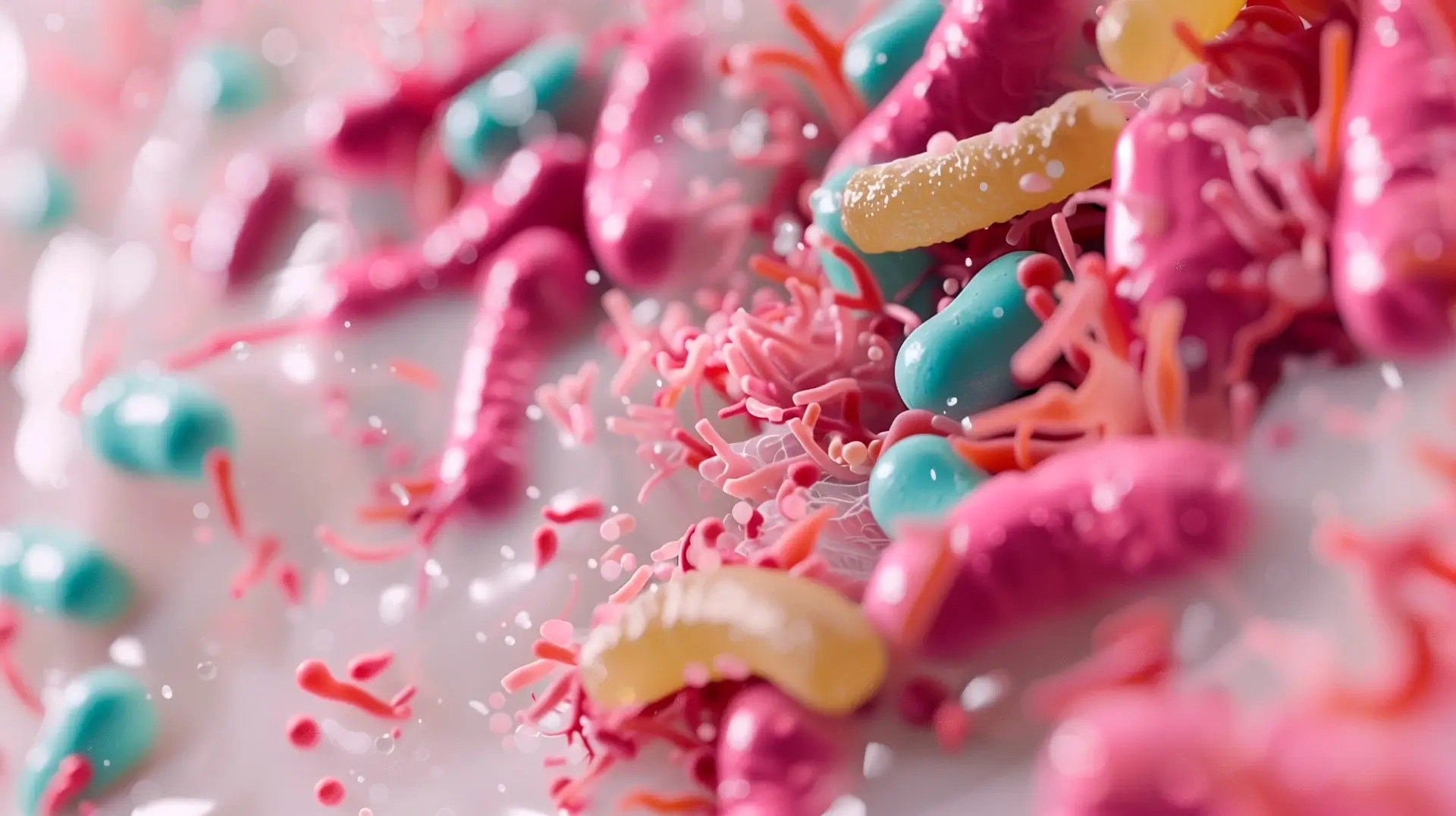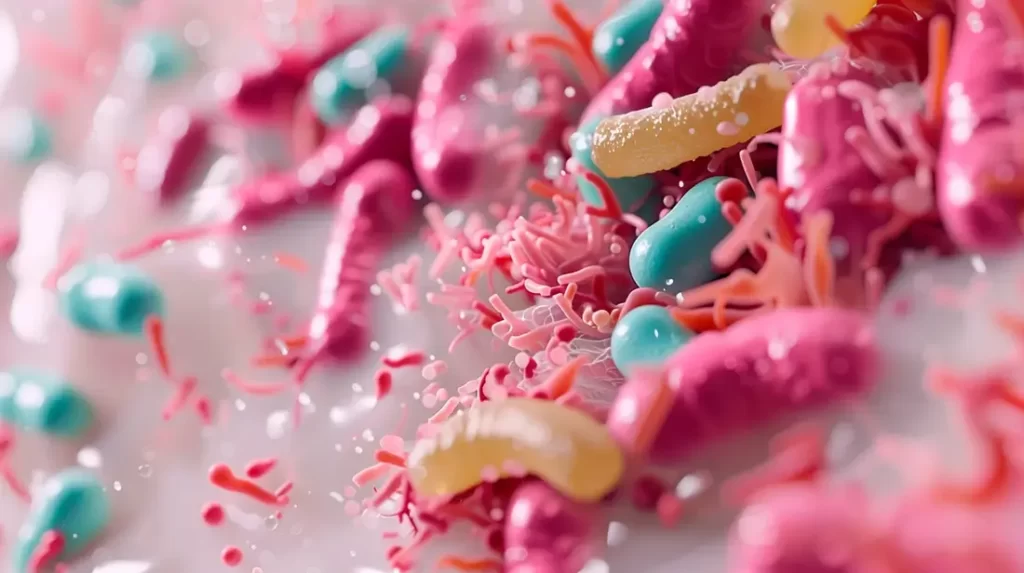
17.07.2024, from Fabio Arcuccifounder of Health Journey
How your gut bacteria determine your health
Discover the potential of your microbiome for well-being and vitality
In this article
- Surprising findings
- Causes of the loss of microbial diversity
- Innovative therapeutic approaches
- Measures to promote a healthy microbiome
- Prebiotics, probiotics, postbiotics
- BS+: An innovative solution for your microbiome
- Other articles that might interest you
- The most interesting studies on the article
Surprising findings
Scientists have made remarkable discoveries over the last two decades. A milestone was reached in 2006 in "Nature" published studywhich showed for the first time that the intestinal flora of slim and overweight people differs significantly.
Since then, our understanding of the microbiome has developed rapidly. Further research has revealed that the intestinal flora of people in industrialized countries such as Germany is significantly less diverse than that of peoples with a traditional way of life, such as the Hadza in Tanzania.
We now know that only around a quarter of the Western population still has a rich microbiome. The majority already lack many essential bacterial species - with potentially far-reaching health consequences.
Imagine your gut as a complex ecosystem. For some people it resembles a lush, species-rich rainforest, for others it is more like an impoverished monoculture. Like any ecosystem, your gut microbiome reacts sensitively to external influences.
Causes of the loss of microbial diversity
The diversity of our gut microbiome is a delicate balance that is threatened by various factors of modern living. Many aspects of our everyday lives that we take for granted can actually have harmful effects on our gut flora.
Below we look at the main causes that contribute to the depletion of our microbial ecosystem. Each of these factors plays an important role in the increasing reduction of bacterial diversity in our digestive tract:
- Caesarean section births: Newborns do not receive the protective bacteria from the birth canal. This first bacterial colonization is crucial for the development of the child's immune system.
- Excessive use of antibiotics: Antibiotics eliminate not only pathogenic but also beneficial intestinal bacteria. This is equivalent to clear-cutting the intestinal ecosystem.
- Low-fiber diet: Many beneficial bacteria are dependent on dietary fiber as a food source. Without it, these important symbionts starve to death.
- Food additives: Can severely disrupt the balance of the intestinal flora. Some act like herbicides in your inner ecosystem.
- Chronic stress and lack of exercise: These factors also negatively affect the composition of your microbiome.
An impoverished microbiome is associated with a variety of diseases - from obesity and diabetes mellitus to chronic inflammatory bowel disease and even cancer.
Increasingly, there are also links with mental disorders such as depression and anxiety disorders. Scientists now speak of a gut-brain axis.
Innovative therapeutic approaches
The good news: Your microbiome can be influenced. Doctors are currently developing groundbreaking treatment methods:
- Fecal transplants: This involves transferring the intestinal flora of healthy donors to patients. For certain infections, this method shows success rates of over 90%.
- Targeted bacterial therapies: Specific bacterial strains are being researched as next-generation probiotics. The aim is to supplement precisely those types of bacteria that are lacking in the individual microbiome.
- Microbiome modulation in oncology: A healthy gut microbiome could significantly improve the effectiveness of chemo- and immunotherapies.
- Mental health: Researchers are investigating the use of certain intestinal bacteria to treat mental illnesses.
Measures to promote a healthy microbiome
Fortunately, you can do a lot for your gut microbiome yourself.
Diversify your diet by trying to consume 25 different types of fruit and vegetables every week. This variety provides your gut bacteria with a broad spectrum of nutrients and thus promotes the diversity of your microbiome.
Increase your fiber intake, as fiber is the main food source for your intestinal bacteria. Incorporate more whole grain products, pulses and nuts into your diet. These foods are particularly rich in fiber and support a healthy gut microbiome.
Integrate fermented foods into your diet. Products such as yoghurt, kefir, sauerkraut or kimchi provide live bacterial cultures that can have a positive influence on your microbiome.
Reduce your consumption of highly processed foods. These often contain additives that can disrupt the delicate balance of your microbiome. Instead, opt for natural, unprocessed foods.
Be careful with antibiotics and only take them if there is a clear medical indication. Discuss possible alternatives with your doctor, as antibiotics can have a lasting effect on your microbiome.
Pay attention to stress management and regular exercise. These factors also have a positive influence on your microbiome. Regular exercise and relaxation techniques can contribute to the health of your gut bacteria.
Consider using pro- and prebiotics to specifically support your microbiome. Consult your doctor or pharmacist to find the right products for you.
Prebiotics, probiotics, postbiotics
In the context of gut health and the microbiome, we often encounter three related but distinct concepts: prebiotics, probiotics and postbiotics. These all play an important role in our well-being, but differ in their function and mode of action.
Prebiotics:
Prebiotics are indigestible fibers that serve as food for beneficial intestinal bacteria. They promote the growth and activity of healthy bacteria in your gut. Examples are resistant starch and pectin, which are found in many plants.
Probiotics:
Probiotics are living microorganisms (usually bacteria) that have health-promoting effects when consumed in sufficient quantities. They can supplement and support your existing microbiome. Well-known examples are Lactobacillus and Bifidobacterium strains, which are often found in fermented foods or food supplements.
These three concepts often work together: Prebiotics feed the probiotics, which in turn produce postbiotics, which all work together to contribute to the health of your gut and your entire body.
BS+: An innovative solution for your microbiome
BS+ was developed to optimize the supply of essential nutrients to your microbiome. This specially formulated dietary supplement offers an effective way to significantly increase your daily fiber intake and provide targeted support for your gut bacteria.
A daily dose of BS+ contains about 17 g of fiber - which is more than half the daily amount recommended by the DGE. In addition, BS+ provides a variety of other nutrients that are essential for a healthy microbiome. The carefully selected ingredients serve as prebiotics, i.e. as food for your beneficial intestinal bacteria.
By taking BS+ regularly, you can:
- Promote the diversity of your microbiome
- Support the production of short-chain fatty acids in the intestine, which have an anti-inflammatory effect
- Optimize your digestion and alleviate digestive complaints
- Strengthen your immune system
- Potentially reduce your risk of various chronic diseases
BS+ is a simple and effective way to do something good for your gut health. It does not replace a balanced diet, but can be a valuable supplement, especially if your usual diet does not provide enough fiber.
Remember: every microbiome is as individual as a fingerprint. What is optimal for one person may not be equally suitable for everyone. Listen to your body's signals and consult your doctor if you have any questions or concerns.
Microbiome research is still in its infancy, but it is already clear that these microscopic creatures in your gut have an immense influence on your health. With products like BS+ and a growing understanding of the importance of your microbiome, new ways of preventing and treating many diseases are opening up. So it's worth making a conscious investment in the health of your inner ecosystem!
Other articles that might interest you
Fighting diabetes with fiber: How to turn your meal into medicine
Feast healthily: The surprisingly simple way to stable blood sugar
The most interesting studies on the article
Turnbaugh, P., Ley, R., Mahowald, M. et al.
An obesity-associated gut microbiome with increased capacity for energy harvest.
in: Nature 444, 1027-1031 (2006).
https://doi.org/10.1038/nature05414
Qin, J., Li, R., Raes, J. et al.
A human gut microbial gene catalogue established by metagenomic sequencing.
in: Nature 464, 59-65 (2010).
https://doi.org/10.1038/nature08821
This study presented the first comprehensive catalog of genes of the human gut microbiome.
Shreiner, A., Kao, J. & Young, V.
The gut microbiome in health and in disease.
in: Curr Opin Gastroenterol. 31(1), 69-75 (2015).
https://www.ncbi.nlm.nih.gov/pmc/articles/PMC4290017/
A review article summarizing the role of the gut microbiome in health and disease.
Valles-Colomer, M., Falony, G., Darzi, Y. et al.
The neuroactive potential of the human gut microbiota in quality of life and depression.
in: Nat Microbiol 4, 623-632 (2019).
https://doi.org/10.1038/s41564-018-0337-x
This study investigated the relationship between the gut microbiome and mental health.
Zeevi, D., Korem, T., Zmora, N. et al.
Personalized Nutrition by Prediction of Glycemic Responses.
in: Cell 163, 1079-1094 (2015).
https://doi.org/10.1016/j.cell.2015.11.001
This study showed how individual differences in the gut microbiome can lead to different reactions to the same foods.
Zimmermann, M., Zimmermann-Kogadeeva, M., Wegmann, R. et al.
Mapping human microbiome drug metabolism by gut bacteria and their genes.
in: Nature 570, 462-467 (2019).
https://doi.org/10.1038/s41586-019-1291-3
This study investigated how gut bacteria can metabolize drugs, which can have an impact on their efficacy and side effects.
